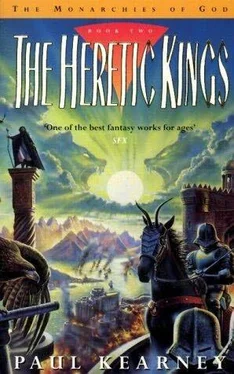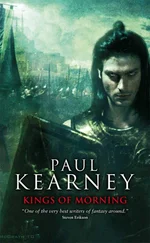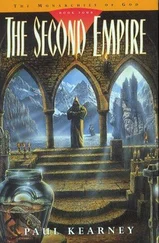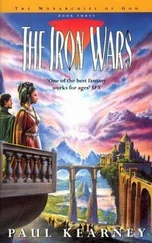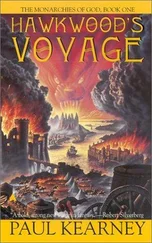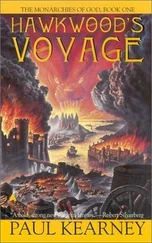Paul Kearney - The Heretic Kings
Здесь есть возможность читать онлайн «Paul Kearney - The Heretic Kings» весь текст электронной книги совершенно бесплатно (целиком полную версию без сокращений). В некоторых случаях можно слушать аудио, скачать через торрент в формате fb2 и присутствует краткое содержание. Жанр: Фэнтези, на английском языке. Описание произведения, (предисловие) а так же отзывы посетителей доступны на портале библиотеки ЛибКат.
- Название:The Heretic Kings
- Автор:
- Жанр:
- Год:неизвестен
- ISBN:нет данных
- Рейтинг книги:3 / 5. Голосов: 1
-
Избранное:Добавить в избранное
- Отзывы:
-
Ваша оценка:
- 60
- 1
- 2
- 3
- 4
- 5
The Heretic Kings: краткое содержание, описание и аннотация
Предлагаем к чтению аннотацию, описание, краткое содержание или предисловие (зависит от того, что написал сам автор книги «The Heretic Kings»). Если вы не нашли необходимую информацию о книге — напишите в комментариях, мы постараемся отыскать её.
The Heretic Kings — читать онлайн бесплатно полную книгу (весь текст) целиком
Ниже представлен текст книги, разбитый по страницам. Система сохранения места последней прочитанной страницы, позволяет с удобством читать онлайн бесплатно книгу «The Heretic Kings», без необходимости каждый раз заново искать на чём Вы остановились. Поставьте закладку, и сможете в любой момент перейти на страницу, на которой закончили чтение.
Интервал:
Закладка:
The unhappy ship sails on, and finally the lookouts sight land. They have reached the Western Continent at last, but they are the only ones to have done so. The wreck of Hawkwood’s other ship is visible on the reef which rings the strange coast, and there is no sign of survivors.
Hawkwood’s Voyage ends with the explorers finally setting foot on the shores of this new land. They have no idea what to expect but they know that Ortelius was trying to prevent them from getting here, as something has prevented ships from surviving the westward voyage for three centuries and more. They suspect that this new world is inhabited. But by whom, or what?
This is the century of the soldier.
Fulvio Testi, 1641
PROLOGUE
Always, men move west. Is it something to do with the path of the sun? They are drawn to it like moths to the flame of a taper.
Many long turning years have slipped by, and still I remain: the last of the founders, my body scarcely my own at the end. I have seen four centuries of the waking world trickle past, their passage scarcely marked by any change in the land I have made my home. Men change, and they like to think that the world changes with them. It does not; it merely tolerates them, and continues to follow its own, arcane revolutions.
And yet there is something in the air, like a whisper of winter in this country which knows no seasons. I feel a change coming.
They came treading the saffron and scarlet course of the sinking sun, as we had always known they would, with their tall ships trailing streamers of weed from worm-eaten hulls.
We watched them from the jungle. Men in salt-encrusted armour with scurvy-swollen faces bearing swords and pikes, and, later, reeking arquebuses, the slow-match glowing and hissing in the wind. Gaunt men of Hebrion, or Astarac, or Gabrion; the sea-rovers of the Old World. Hard-handed buccaneers with the greed dazzling their eyes.
We had come here fleeing something; they had come seeking. We gave them fear to fill their bellies and night-dark terror to plump out their purses. We made of them the hunted, and took from them whatever we desired.
Their ships rotted slowly at their moorings, untenanted and filled with ghosts. A few, a very few, we let live, to take the tale of us back east to the Monarchies of God. In this way, the myth was created. We hid our country behind a curtain of tall tales and dark rumours. We laced the truth with the hyperbole of madness; we beat out a legend as though it were the blade of a sword on a smith’s anvil. And we quenched it in blood.
But the change is coming. Four centuries have we lingered here, and our people have slowly filtered back to the east in accordance with the plan. They are everywhere now in Normannia. They command soldiers, they preach to multitudes, they watch over cradles. Some of them have the ear of kings.
The time is come for our keels to recross the Western Ocean, and claim what is ours. The beast will out, in the end. Every wolf will have its day.
PART ONE
ONE
Year of the Saint 551
Vespers had long since been rung, but Brother Albrec had affected not to hear. He chewed the end of his quill so that damp bits of feather dropped on to the bench, but he did not notice. His face, squinting in the dim light of the dip, was akin to that of a near-sighted vole, pointed and inquisitive. His hand shook as he turned the page of an ancient parchment which lay before him. When once a corner crumbled at the touch of his nimble fingers he whined a little back in his throat, for all the world like a dog seeing its master leave the room without it.
The words on the parchment were beautifully inscribed, but the ink had faded. It was a strange document, he thought. There were none of the illuminations which had always been thought so necessary an adornment to the holy texts of Ramusio. Only words, stark and bare and elegantly written, but fading under the weight of so many years.
The parchment itself was poor quality. Had the scribe of the time possessed no vellum? he wondered, for this was hand-enscribed, not churned out on one of the famous presses of Charibon. This was old.
And yet it was almost as though the author had not wanted to draw too much attention to the work. And indeed the manuscript had been found, a rolled-up wad of untidy fragments, stuffed into a crack in the wall of one of the lowest of the library levels. Brother Columbar had brought it to Albrec. He had thought perhaps to use the parchment as blotting for the scriptorium, for Charibon still produced hand-written books, even now. But the faint, perfect writing visible upon it had made him hesitate, and bring it to the attention of the Assistant Librarian. Albrec’s natural curiosity had done the rest.
Almost he halted, rose from his seat to tell the Chief Librarian, Brother Commodius. But something kept the little monk rooted there, reading on in fascination while the other brothers were no doubt sitting down to their evening meal.
The scrap of parchment was five centuries old. Almost as old as Charibon itself, holiest of all the university-monasteries on the continent now that Aekir was gone. When the unknown author had been writing, the Blessed Ramusio had only just been assumed into heaven-conceivably, that great event had happened within the lifetime of the writer.
Albrec held his breath as the petal-thin parchment stuck to his sweating fingers. He was afraid to breathe on it for fear that the ancient, irreplaceable text might somehow blur and run, or blow away like sand under some sudden zephyr.
. . and we begged him not to leave us alone and bereft in such a darkening world. But the Blessed Saint only smiled. “I am an old man now,” he said. “What I have begun I leave to you to continue; my time here is finished. You are all men of faith; if you believe in the things which I have taught you and place your lives in the hand of God, then there is no need to be afraid. The world is a darkening place, yes, but it darkens because of the will of man, not of God. It is possible to turn the tide of history-we have proved that. Remember, in the years ahead, that we do not merely suffer history, we create it. Every man has in him the ability to change the world. Every man has a voice to speak out with; and if that voice is silenced by those who will not listen, then another will speak out, and another. The truth can be silenced for a time, yes, but not for ever. .
The rest of the page was missing, torn away. Albrec leafed through the indecipherable fragments that followed. Tears rose in his eyes and he blinked them away as he realized that the parts which were missing were indeed lost beyond recall. It was as if someone had given a thirsting man in a desert a drop of water to soothe his parched mouth, and then poured away a quart into the sand.
Finally, the little cleric got off his hard bench and knelt on the stone floor to pray.
The life of the Saint, an original text which had never been seen before. It told the story of a man named Ramusio, who had been born and who had lived and grown old; who had laughed and wept and spent sleepless nights awake. The story of the central figure in the faith of the western world, written by a contemporary-possibly even someone who had known him personally. .
Even if so much of it had been lost, there was still so much gained. It was a miracle, and it had been granted to him. He thanked God there on his knees for revealing it to him. And he prayed to Ramusio, the Blessed Saint whom he was now beginning to see as a man, a human being like himself-though infinitely superior, of course. Not the iconic image the Church had made him out to be, but a man. And it was thanks to this incredibly precious document before him.
Читать дальшеИнтервал:
Закладка:
Похожие книги на «The Heretic Kings»
Представляем Вашему вниманию похожие книги на «The Heretic Kings» списком для выбора. Мы отобрали схожую по названию и смыслу литературу в надежде предоставить читателям больше вариантов отыскать новые, интересные, ещё непрочитанные произведения.
Обсуждение, отзывы о книге «The Heretic Kings» и просто собственные мнения читателей. Оставьте ваши комментарии, напишите, что Вы думаете о произведении, его смысле или главных героях. Укажите что конкретно понравилось, а что нет, и почему Вы так считаете.
